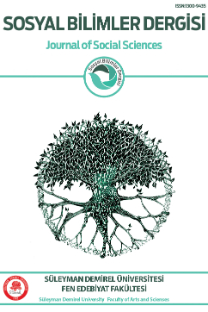Modern edebiyat dünyası ile yüzleşmek: 1900-1920 arası William Dean Howells
Confronting the modern literary marketplace: William Dean Howells between 1900 -1920
___
AARON, Daniel, Men of Good Hope: A Story of Americas Progressives, New York: Oxford University Press, 1951.ABELN, Paul, William Dean Howells and the Ends ofRealism, New York: Routledge, 2005.
ALEXANDER, William, William Dean Howells: The Realist as Humanist, New York: Ayer Publishing, 1981.
ANESKO, Michael, Letters, Fictions, Lives: Henry James and William Dean Howells, New York: Oxford University Press, 1997.
ANESKO, Michael, William Dean Howells and the Bourgeois Quotidian: Affection, Skepticism, Disillusion, Lamb, Robert Paul and G.R. Thompson (eds.), A Companion to American Fiction, 1865-1914 , Malden, MA: Blackwell, 2005, pp. 499 -518.
ARAC, Jonathan, Babel and Vernacular in an Empire of Immigrants: Howells and the Languages of American Fiction, boundary 2, No: 43, Vol:2, 2007, pp.1 -20.
ARAC, Jonathan, The Age of the Novel, the Age of Empire: Howells, Twain, James around 1900, Yearbook of English Studies, Vol: 41, No: 2, 2011, pp. 94- 105.
BAYM, Nina (ed.), The Norton Anthology of American Literature, Volume II, Seventh Edition, New York: Norton, 2007.
BRODHEAD, Richard (ed.), New Essays on Moby-Dick, Cambridge: Cambridge University Press, 1986.
BUELL, Lawrence, The Dream of the Great American Novel, Harvard: Belknap, 2014.
CADY, Edwin, The Realist at War: The Mature Years, 1885-1920, of William Dean Howells, Syracuse: Syrac use University Press, 1958.
CHASE, Richard, The American Novel and its Tradition , Baltimore, Maryland: The Johns Hopkins University Press, 1957.
CLARA, Marburg Kirk, American Writers Series, William Dean Howells, New York: Amer ican Book Company, 1950.
COOKE, Delmar Gross, William Dean Howells: A Critical Study, New York: E. P. Dutton and Company, 1922.
CROWLEY, John William, William Dean Howells 1837 -1920, The Heath Anthology of American Literature, Paul Lauter (ed.), Volume II, Lexington, Massachusetts: D.C. Heath and Company, 1990.
CROWLEY, John William, The Dean of American Letters: The Late Career of William Dean Howells, Am herst: University of Massachusetts Press, 1999.
DAVIDSON, Rob, The Master and the Dean, The Literary Criticism of Henry James and William Dean Howells, Columbia: University of Missouri Press, 2005.
EKSTROM, William F., The Equalitarian Principle in the Fiction of William Dean Howells, Cady, Edwin H. and Louis J. Budd (eds.), On Howells, The Best from American Literature, Durham: Duke University Press, 1993, pp. 30 -40.
GOLDMAN, Laurel T., A Different View of the Iron Madonna: William Dean Howells and His Magazine Readers, The New England Quarterly, Vol: 50, No: 4, 1977, pp. 563 -586.
GOTTESMANN, Ronald, Introduction, David J. Nordloh (ed.), W. D. Howells: Selected Literary Criticism , Volume III, 1898 -1920, Indianapolis: Indiana University Press, 1993.
GREIF, Mark, The Death of the Novel and Its Afterlives: Toward a History of the Big, Ambitious Novel, boundary 2, Vol: 36 No: 2, 2009, pp. 11 -30.
HIGGINS, Brian and Hershel Parker (eds.), Critical Essays on Herman Melvilles Moby-Dick, New York: Macmillan, 1992.
HOWELLS, William Dean, Matthew Arnold and Distinction in America, 1888, reprinted in David J. Nordloh (ed.), W.D. Howells: Selected Literary Criticism, Volume II, 1886 - 1897, Indianapolis: Indiana University Press, 1993.
HOWELLS, William Dean, The Man of Letters as a Man of Business, 1893, reprinted in Literature and Life, Charleston: Bibliolife, 2008.
HOWELLS, William Dean, Novel-Writing and Novel-Reading, 1899, reprinted in David J. Nordloh (ed.), W. D. Howells: Selected Literary Criticism , Volume III, 1898 -1920, Indianapolis: Indiana University Press, 1993.
HOWELLS, William Dean, The Art of the Adsmith, 1902, reprinted in Literature and Life, Charleston: Bibliolife, 2008.
HOWELLS, William Dean, The Functions of the Critic, 1902, reprinted in David J. Nordloh (ed.), W. D. Howells: Selected Literary Criticism , Volume III, 1898 -1920: Indiana University Press, 1993.
KAPLAN, Amy, The Social Construction of American Realism, Chicago: University of Chicago Press, 1992.
KNOPER, Randall, backmatter to Crowley, John William, The Dean of American Letters: The Late Career of William Dean Howells, Amherst: University of Massachusetts Press, 1999.
LEVINE, Robert S., The Cambridge Companion to Herman Melville, Cambridge: Cambridge University Press, 1998.
MATTHIESSEN, F. O., American Renaissance: Art and Expression in the Age of Emerson and Whitman , Oxford: Oxford University Press, 1941.
MICHAELS, Walter Benn, The Gold Standard and the Logic of Naturalism: American Literature at the Turn of the Century, California: University of California Press, 1987.
PALMER, Stephanie, Realist Magic in the Fiction of William Dean Howells,Nineteenth - Century Literature, Vol: 57, No: 2, 2002, pp. 210 -236.
PEASE, Donald (ed.), New Essays on The Hazard of New Fortunes , Cambridge, Cambridge University Press, 1991.
PIZER, Donald (ed.), Documents of American Realism and Naturalism, Carbondale: Southern Illinois University Press, 1998.
ROHRBACH, Augusta, Youre a Natural-Born Literary Man: Becoming William Dean Howells, Culture Maker and Cultural Marker, The New England Quarterly, Vol: 73, No: 4, 2000, pp. 625 -653.
SPARK, L. Clare, Hunting Captain Ahab: Psychological Warfare and the Melville Revival, Ohio: Kent State University Press, 2006.
TRILLING, Lionel, The Moral Obligation to be Intelligent: Selected Essays, Leon Wiseltier (ed.), New York: Farrar, Straus, and Giroux, 2000.
- ISSN: 1300-9435
- Yayın Aralığı: 3
- Başlangıç: 1995
- Yayıncı: Süleyman Demirel Üniversitesi, Fen-Edebiyat Fakültesi
Einsatz des märchens im fremdsprachlichen Deutschunterricht
Satraplık sisteminin pers yönetim teşkilatındaki yeri
Re- creating the doppelganger in peter ackroyd's the casebook of victor frankenstein
Milli parkların sürdürülebilir kullanımı ve yönetim planı önerisi: Isparta ili örneği
İSMAİL KERVANKIRAN, ADİLE GÜL ERYILMAZ
Kırım Tatar Türkçesi ve Türkiye Türkçesi arasında yalancı eşdeğerler
Ekspresyonizmde hıristiyanlık ve çarmıhta İsa tasvirinin kullanımı
20. Yüzyıl başlarında İstanbul hapishane -i umumi 'de mahkûmların üretim faaliyetleri
Refet Paşa'nın İstanbul'a Girişi ve tıbbiyelilerce karşılanışı
Hayranlık, dostluk ve çıkar üçgeninde Türk- Alman İlişkileri
